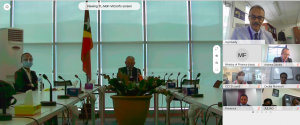The Ministry of Finance, European Union and United Nations virtually launch a new framework to mobilise financial resources to ensure the achievement of the Sustainable Development Goals

A robust financial framework with strategic investments, including pro-health taxation, diaspora financing, and climate financing, will be a catalyst for increasing sustainable development investments.
Dili, 30 March 2021 – The Minister of Finance, Rui Gomes, the United Nations (UN) Resident Coordinator, Roy Trivedy and the European Union (EU) Ambassador to Timor-Leste, Andrew Jacobs, virtually launched today the Integrated National Financing Framework (INFF). This Government-led initiative is a framework for financing national sustainable development priorities as laid out in the National Strategic Development Plan 2011-2030 (SDP) and the Sustainable Development Goals (SDGs). Three financing areas, including pro-health taxation, diaspora financing, and climate financing, have been identified for catalysing strategic investments in Timor-Leste.
The INFF Timor-Leste is being supported by the UN System, the EU, and partners as a planning and delivery tool to finance the SDGs at the national level. The framework analyses all financing sources and non-financial means of implementation available. It also designs a financing strategy to mobilise and increase additional resources, manage risks, and achieve national development priorities as outlined in the SDP and the SDGs.
INFF will be closely aligned with and contribute towards the Government’s ongoing Public Finance Management reform, one of the priority reform areas of the Government, and provide tangible support to the implementation of the COVID-19 Economic Recovery Plan and sectoral strategies. INFF can also be used by the Government to deliberate on and prepare for the post-Petroleum future of Timor-Leste.
In his opening Remarks, Minister Rui Gomes said, “This instrument would be an alternative source of financing and investment to develop a diversified, inclusive, sustainable and resilient economy for the bettermen of the Timorese as a society that we all are aspiring for. The instrument would also guide and help the government of Timor-Leste to define its policies on public financial management with the aim of having a well-integrated budgeting and planning processes.”
Recognising the socio-economic impact of the COVID-19 pandemic in Timor-Leste and the rest of the world, the UN Resident Coordinator, Roy Trivedy noted: “As Timor-Leste and the world try to recover from the pandemic that has disproportionately impacted the most vulnerable and marginalised groups, it becomes more important than ever that we build a more inclusive and greener future as envisaged in the 2030 Agenda and the SDGs. The United Nations – through funding from the global Joint SDGs Fund – and together with the EU and other development partners, are committed to supporting the Government’s efforts to finance and implement the SDP, and accelerate progress towards the SDGs.”
Recalling the objectives of the INFF, EU Ambassador to Timor-Leste, Andrew Jacobs, said “The INFF is a country-led process that seeks to ensure the effective financing and implementation of development strategies together with climate and environment plans and ambitions for a green and circular economy. In Timor-Leste it will help to ensure the optimal financing and implementation of the post-COVID Economic Recovery Strategy, which will guide future EU support to the country.”
The overall goal of INFF Timor-Leste is to identify and leverage additional finance for sustainable development objectives through growing the fiscal space, increasing the domestic and international private and public sector investments, and more substantial planning and budgeting aligned with the SDGs and the SDP. INFF will also help improving the governance and coordination, articulate a financing strategy and strengthen the monitoring and oversight framework. A range of stakeholders from the private sector such as Chamber of Commerce and Industry Timor-Leste (CCI-TL), financial institutions (including the Central Bank of Timor-Leste), development partners, NGOs, Civisl Society Organizations (CSOs), community groups and the local governments will be engaged in the INFF process.
This vritual event was concluded with an online INFF Workshop with technical presentations from the newly established INFF Secretariat, WHO, IOM, and the Secretary of State for Environment. The latter three presentations were focused on three financing areas identified for catalysing strategic investments in Timor-Leste, namely pro-health taxation, diaspora financing, and climate financing.
The event was participated by the representatives of the relevant Government line ministries, Central Bank of Timor-Leste, UN Agencies, Diplomatic Corps, Development Partners, Private Sector, CSOs and the relevant management of the Ministry of Finance.










































